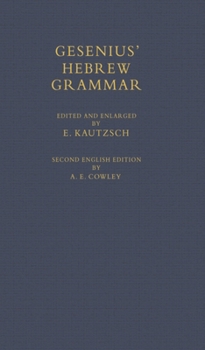Gesenius' Hebrew Grammar
Select Format
Select Condition 
Book Overview
With a facsimile of the Siloam Inscription by: Euting, J.;
Format:Hardcover
Language:English
ISBN:0198154062
ISBN13:9780198154068
Release Date:February 1922
Publisher:Oxford University Press, USA
Length:614 Pages
Weight:1.94 lbs.
Dimensions:1.5" x 6.2" x 8.4"
Customer Reviews
5 ratings
Seminary Textbook
Published by Thriftbooks.com User , 17 years ago
This is the grammar we used in Seminary, and I detested it then. But, now that I'm older and reading it for pleasure and not for a grade, I realize just how well this book is written, how well it is organized, and just what a gem it is. If you have a 'working' knowledge of Hebrew and want to know a more, this book will help you. If you are a Hebrew scholar and want to have a reference tool, this book is excellent. The only person who shouldn't buy this book is that person who is just starting to learn Hebrew. There are other resources available for the beginning student -- you should wait until you have a 'decent' knowledge of Hebrew before you get this book. But, if you want to continue your studies and get one of the best grammar references available, this is it. Peace Profound, Neshamah
A reference point
Published by Thriftbooks.com User , 18 years ago
A great work. Not for faint-hearted ones. The problem with this type of subject is to know what is still considered correct, as research proceeds. But, of course, that by no means diminishes the value of the book! Certainly a must have for serious, deep-digging students.
By far the best in Hebrew Grammars
Published by Thriftbooks.com User , 21 years ago
I have used many other grammars in my studies of Biblical Hebrew and none have been as helpful as this one. I would seriously consider selling the others if they were not required texts for my future studies. His handling of Hebrew and cognate languages will give a student a much deeper knowledge than many of the modern grammars targeted at a lazier student audience.
A "Must Have," and Worth All the Work Needed to Read It
Published by Thriftbooks.com User , 22 years ago
Whether one is taking formal education classes or is seeking to read Biblical Hebrew on his/her own, this text will have to become part of the personal library. There are grammatical issues in Hebrew that are never explained in 1st-year grammars, but one will need to know them, and Gesenius provides this.I recommend reading this book from cover to cover at least twice: once as a studious overview, secondly as a serious study, maybe putting notes into your Hebrew text. But the following explanation is needed: there are portions of information that do not have to be known too thoroughly to understand what one is reading in the Hebrew Tanach. Much of the information is analytical more from a linguistics standpoint. In other words, don't think you need to know everything in the book. But embedded within the optional information is other information one will need; so all the book must be read.The book can be broken down into 3 levels:1. That which every serious student must know. This would mean that most of the book needs to be known, with probably placing details into your Hebrew text for reference. This text is especially needed for grammatical variations not found in basic grammars (e.g., a rare form of the infinitive used with intransitive verbs; the fem. objective affix seemingly having no antecedent, but actually having a previous phrase or clause for its antecedent, regardless of gender, Gen. 15:6); the ignoring of gender at times, etc. Like any other language, Hebrew has grammatical structures that have "broken the rules."2. That which is interesting to know and which may or may not really help in translation. This would, for instance, include some of the heavier details concerning rules for vowel changes, etc.3. That which surely does not need to be known to read and understand Hebrew. This information is for people who are grammar geeks, who need to know how things work even though not knowing this information will not hurt anyone's communication skills. Much of this has to do with comparing Hebrew with other Semitic and European languages. It's interesting, and in other fields, it is important; but for the Hebrew reader, this tends to be ineffectual in helping the student who is learning to read Hebrew. Don't be discouraged by this stuff as you read the book; read it and move on.Just as with English, volumes can be written on how a language works, and Gesenius provides this. But no one needs to know the most intricate circuitry to communicate. For instance, speakers in English say, "If he were to go, I would stay." The rule for having a plural verb for the singular pronoun is: "3rd person singular subjunctive uses a plural verb." Most people don't know this, and yet they speak correctly. The same is true with Hebrew: You can get overloaded with the details, and yet without those details a student of Hebrew won't have a problem.As one progresses in the book, the information becomes more practical in a sense, moving
Wonderful Reference
Published by Thriftbooks.com User , 24 years ago
This book is standard reference for people who already have a basic knowledge of the Hebrew Language and want to dive deeper into it. The explainations are long and detailed (that's a good thing), and it gives nice info on the history of Hebrew, as well as a chart of the evolution of the Hebrew & Aramaic script from old to square characters. Although it is comprehensive, some of its theories are quite outdated by modern research. The best Hebrew grammar in this regard is Jouon-Muraoka.





